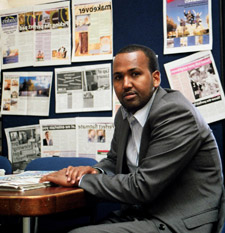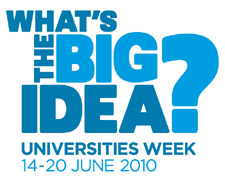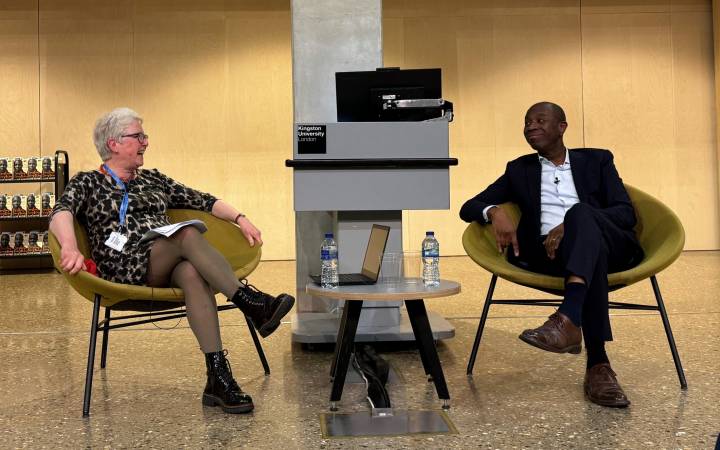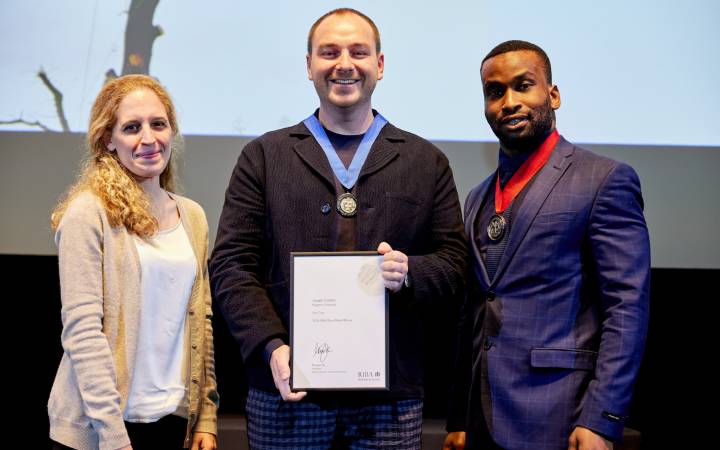From Somali refugee to award-winning international reporter
Posted Wednesday 16 June 2010
 Jamal Osman fled the violence in his home country of Somalia and arrived in the UK with no money, nowhere to live and unable to speak English. This month he has won Amnesty International's Gaby Rado Memorial Award in recognition of his work on human rights and is now one of the UK's top investigative journalists. Jamal scooped the world's press with his interviews with Somali pirates and his exposure of the illegal trade in UN food aid, and broke both these major stories whilst still a student at Kingston University.
Jamal Osman fled the violence in his home country of Somalia and arrived in the UK with no money, nowhere to live and unable to speak English. This month he has won Amnesty International's Gaby Rado Memorial Award in recognition of his work on human rights and is now one of the UK's top investigative journalists. Jamal scooped the world's press with his interviews with Somali pirates and his exposure of the illegal trade in UN food aid, and broke both these major stories whilst still a student at Kingston University.
"It was going to Kingston University that gave me the key to life," Jamal, 30, said. "After arriving in the UK, I was focused on surviving and took jobs in warehouses. But I wanted to do more. At University I met so many fascinating people. You learn so much and become a more mature person. Now I can use my skills to expose corruption and injustice around the world. Without University, I would still be working in a warehouse."
In 2009, during the third year of his degree course, Jamal's report for Channel 4 News revealed that thousands of sacks of UN food aid were being sold by Somali businessmen, with refugees being forced to pay for aid at gunpoint. "In Mogadishu, researching it, I was nervous 24/7. But I had good people watching my back. I told myself that I'm just one person, while every day people are dying of hunger."
The head of the UN's £580m aid operation in Somalia launched an inquiry, which reported that up to 50 per cent of its World Food Programme aid was not reaching people in need, and three Somali aid transport contractors were suspended. The exposé secured Jamal the News Story Prize of the Year at the 2009 Foreign Press Association Awards and a nomination for a prestigious Royal Television Society Award. As a child in war-torn Somalia, such success was hard to imagine.
"Growing up in Somalia was horrendous, and not something you would wish for any human being. It is lawless and people kill each other on a daily basis. There was no education, no functioning society, so my education was interrupted from an early age. I had to try and survive rather than thinking about going to school. I remember jumping over dead bodies and seeing people shot, with their bodies jumping from the bullets." But Jamal's early exposure to violence helped hone his fearless reporting instincts. "As a child, if you heard gunshots, you ran towards them to see what was going on," he said.
Jamal arrived in the UK in 1999, after paying people traffickers to take him to Europe. "I was so desperate to get out that I just had to trust them," he said. He made his way to Southall, where he found someone from his clan. "It's ironic, in Somalia people are always fighting, but when they are in a different country even the clans get on well," Jamal said.
He was granted asylum and worked in warehouses, earning a fork-lift truck licence, and in 2005 decided to go back to education. "I longed to help my people back in Somalia. There was no point in going into politics there, as it is so corrupt. But by taking a journalism and media course, I could help bring their stories to the world."
 It was a tough decision financially. Jamal had married in 2001 and had a child, with a second baby on the way. "We decided we would suffer in the short-term, as it would pay off." After an access course, Jamal joined Kingston University to study for a BA (Hons) in journalism, working as a minicab driver at weekends, which proved a perfect source of stories. "My English was still poor and I knew I had to go the extra mile. If I saw a fire engine or police car with their sirens on, I'd follow them, sometimes with a customer in the cab!" Local papers got to know Jamal and began running his stories.
It was a tough decision financially. Jamal had married in 2001 and had a child, with a second baby on the way. "We decided we would suffer in the short-term, as it would pay off." After an access course, Jamal joined Kingston University to study for a BA (Hons) in journalism, working as a minicab driver at weekends, which proved a perfect source of stories. "My English was still poor and I knew I had to go the extra mile. If I saw a fire engine or police car with their sirens on, I'd follow them, sometimes with a customer in the cab!" Local papers got to know Jamal and began running his stories.
He gained further experience as news editor on the Kingston University student newspaper, The River, and spent his student loan travelling back and forth to Africa in search of stories. In 2008, he landed interviews with Somali pirates in the same week that a 1,000-foot-long supertanker, the Sirius Star, was seized. Jamal's footage was used by media around the world, and the third-year student had pulled off the scoop of the year. This was followed by his exposé of the illegal trade in UN food aid during his final month at University.
"My aim is to keep exposing stories around the world," Jamal said. 'After a year at Kingston, I was confident enough to start practicing journalism, and going to University has made me much more mature and knowledgeable in general. I've benefited personally and financially, and earned enough in my first year at work to repay the cost of going to University. Without it, I would have stayed in a warehouse job, but now I am a professional journalist. I want to bring all kinds of international stories to the world's attention. I have the power to do that, and that's what pushes me to do my job."
Professor Brian Cathcart, Head of Journalism at Kingston University, described Jamal as an inspiration. "We are tremendously proud of Jamal, though in truth he's the one who should get the credit for his achievements. He worked extremely hard - on his written English, which wasn't great when he arrived, and on his journalism - and achieved all this while helping to raise a young family and earning a living as a minicab driver. He's a perfect example of how a university education can help to improve an individual's life and benefit society as a whole."
Universities Week
The inaugural University Week is taking place from 14-20 June 2010, and aims to increase public awareness of the wide and varied role - economic, social and cultural - of the UK's universities. More than 100 universities and linked organisations are involved in the week.
Find out more about the campaign by joining the Universities Week Facebook fan page www.facebook.com/ukuniversities.
For regional media enquiries about Universities Week, contact: Ian Morton at ian.morton@universitiesuk.ac.uk, 020 7419 5424.
For national media inquiries about Universities Week, contact: Victoria Clarke at victoria.clarke@kindredagency.com, 020 7612 8816.
Contact us
General enquiries:
Journalists only:
- Communications team
Tel: +44 (0)20 8417 3034
Email us



